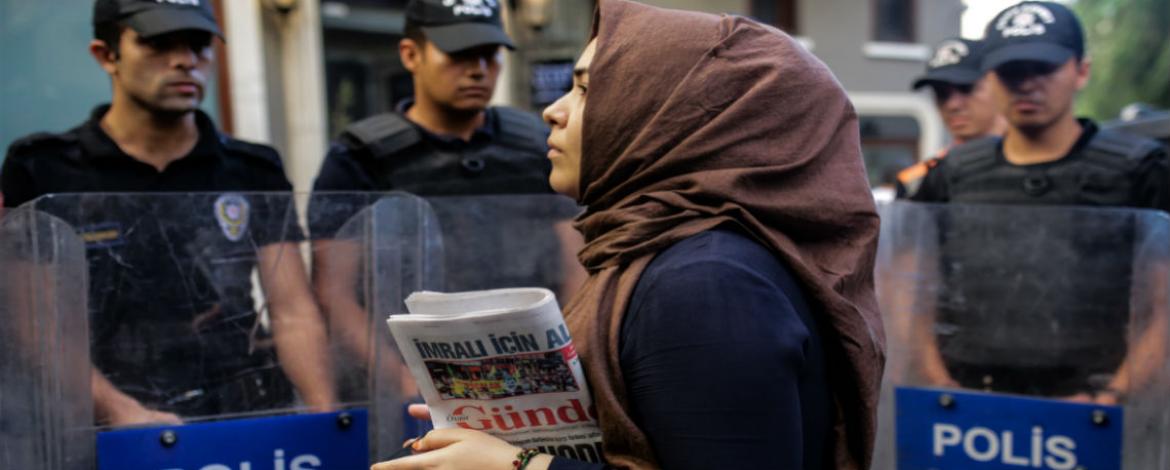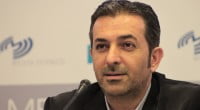Crackdown on journalists leaves void in post-coup Turkey

Date posted: September 22, 2016
Lack of investigative media means many questions remain over events of July 15th
Two months since a failed military coup sent shockwaves through Turkey, independent investigations into who was responsible, and why, have failed to emerge.
That is down in large part to the gutting of Turkey’s independent press. More than 115 journalists have been imprisoned and hundreds more fired since the July 15th coup attempt, while 130 media outlets have been shuttered. That, in addition to the sacking of more than 1,000 media workers in the previous 12 months, has left crucial questions unanswered.
Put simply, there is no one left – or willing – to overturn the stones on which the failed military takeover was built. Despite the absence of any real evidence against US-based Fethullah Gulen, a point cited by Washington for its sluggishness to open extradition proceedings against the cleric, the
Turkish government and president Recep Tayyip Erdogan have gone to great lengths to cast responsibility for the coup on him and his followers.
Booklets depicting Mr Gulen’s involvement have been dispatched to foreign press corps and anti-coup rallies. The Turkish press lambasted the cleric daily. Mr Gulen denies any involvement in the events, which left 271 people dead.
Dozens more reporters have had passports revoked and more than 330 have had press credentials cancelled. For independent Turkish journalists either with links to Gulenist media or endeavouring to do their job of investigating the events of July 15th – one of the most significant events in modern Turkish history – life has become a living nightmare.
‘Don’t bother us’
“I think they wanted to scare me by arresting me. And their second message was to the rest of the critical journalists. Even if you are not Gulenists, they’re saying ‘take care, don’t bother us’,” said Bulent Mumay, arrested on July 26th for alleged links to a terrorist organisation.
“They just showed me a couple of stories that I’ve published, some tweets. Actually the things that they asked me were nothing. They just printed out what they found about me by Googling my name,” he said.
A lucky few have fled. In May former editor of the centrist Cumuhuriyetnewspaper, Can Dundar, was sentenced to five years and 10 months for a story suggesting Turkish forces shipped weapons to Syrian rebels in 2014. A recipient of this year’s International Press Freedom prize, he is thought to have escaped to Germany since his release pending an appeal. Mr Dundar was shot at outside the courthouse on the day of his sentencing in May, and following the failed coup resigned. Last weekend his wife had her passport seized at Ataturk airport.
Though unaffiliated with Gulen’s network, Kurdish outlets and journalists have been affected by the 90-day state of emergency and post-coup purge that led to the detention of 12 Kurdish journalists. Turkish authorities repeatedly conflate Kurdish separatists, Isis and Gulen supporters as a united threat.
Mr Gulen, in May charged with heading up a terrorist organisation, has millions of supporters in Turkey who adhere to his brand of social democratic Islam. Over decades Gulenists opened schools, media outlets and held prominent jobs in the judiciary and police forces.
President Erdogan turned on his ally in late 2013 when police acting on court orders attempted to seize documents and detain individuals close to the president and his family. Since then, their influence has been greatly reduced and the group thoroughly persecuted.
More worrisome for the country, however, is the absence of independent reporting to figure who exactly was responsible for the failed coup.
Mr Mumay, who could face a seven-year sentence, says there are specific reasons for that. “If you publish anything which has different details than the government’s story, you may be in trouble. So no one would dare to publish a story about what really happened at that night . . . If the public cannot learn what really did happen, how can they decide for their future?”
‘Secretly communicating’
The conspiracy theories in Turkey include reports by pro- government media accusing Mr Gulen and his backers of secretly communicating using serial numbers on one dollar bills. Some officials have blamed Washington for playing a role, even as others denied it.
“If you step outside of the general rhetoric as a politician, a journalist or even an individual citizen you face certain risks,” says Ozgur Ogret, the Turkey representative for the Committee to Protect Journalists. “These risks range from being labelled as a pro-coup traitor to being imprisoned as a terrorist . . . Journalists who dare to criticise the ongoing crackdown against all dissident voices in Turkey are gambling with their freedom.
Source: The Irish Time , September 21, 2016
Tags: Defamation of Hizmet | Freedoms | Military coups in Turkey | Turkey |
























